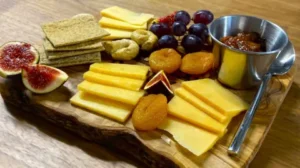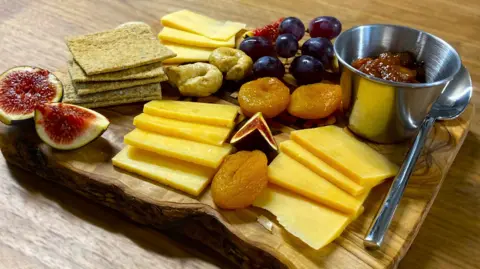In an unassuming building located in Stratford, east London, a pioneering new venture is underway by the British start-up Better Dairy, which is dedicated to revolutionizing the cheese industry through the development of lab-grown cheese. Their claim, supported by their rigorous efforts, is that their product closely mimics the traditional flavor and texture of dairy cheese while being entirely free of animal products. This innovation forms part of a broader movement among several companies across the globe striving to make lab-grown cheese accessible to consumers in the near future.
Despite the promising advancements in lab-grown cheeses, recent trends suggest that the appetite for plant-based alternatives is dwindling. According to statistics released by the Agriculture and Horticulture Development Board (AHDB), sales of plant-based cheese in the UK witnessed a significant decline of 25.6% in the first quarter of 2025. In contrast, conventional cow’s cheese experienced a 3% growth during the same period. One of the primary reasons attributed to this decline is the small percentage of vegans in Britain, which constitutes only about 1% of the population, as per the AHDB, although the Vegan Society estimates this figure to be around 3%. This stark contrast highlights the larger market for dairy cheese consumers compared to the niche market for vegan options.
The Vegan Society, however, remains optimistic, stating that the market for meat-free products, including vegan cheese, is steady and competitive, despite the falling numbers. They highlight additional challenges facing plant-based cheeses, such as concerns about health implications and pricing. Many consumers expressed strong reservations regarding processed foods, with a survey indicating that prices associated with vegan cheeses remain a significant deterrent, as these alternatives often come at a premium relative to their cow’s milk counterparts.
As companies such as Better Dairy and Those Vegan Cowboys attempt to break into the cheese market, there remains uncertainty over whether their innovations will succeed or falter. For instance, the Dutch company Those Vegan Cowboys is preparing to introduce its lab-grown cheeses to the U.S., projecting its presence in the European market within three to four years, contingent upon the completion of regulatory approvals since lab-produced cheeses are categorized as “novel foods.”
Hille van der Kaa, the chief executive of Those Vegan Cowboys, acknowledges the current low demand for vegan cheese but is determined to incite a transformation by promoting the use of cheese alternatives in commonly consumed products such as frozen pizzas where consumers typically do not scrutinize the cheese used. This potential for substitution reflects a broader opportunity for businesses targeting the consumer market.
In a parallel effort, Better Dairy is developing its product range, initially focusing on cheddar, which they believe has the most significant “quality gap” compared to dairy cheese. With a planned launch expected in three to four years, CEO Jevan Nagarajah expressed hope that the price point would align more closely with that of artisanal cheeses before eventually making their products available at supermarket prices.
An important aspect of this push for innovation lies in the processes utilized for creating lab-grown cheese. Better Dairy employs genetically modified yeast to produce casein, the essential protein found in milk, and combines it with plant-based fats to replicate the taste and texture of traditional cheeses. After sampling their various aged cheddar selections, some tasters noted a resemblance to conventional cheese, particularly in terms of melting on burgers and flavors, indicating positive first impressions, albeit with suggestive areas for enhancement.
However, challenges remain. Current lab-grown cheeses have not yet entirely matched the sensory experiences delivered by traditional dairy products. The landscape of vegan cheese is further complicated by consumer perceptions; an AHDB survey revealed that approximately 40% of consumers who tried vegan cheese opted not to repurchase it due to taste dissatisfaction. The Vegan Society stresses that preferences vary among vegans, with some desiring products that imitate dairy closely while others advocate for entirely unique flavors.
Despite advances in lab-grown cheese technology, there seems to be apprehension about its acceptance in the mainstream market. Judith Bryans from Dairy UK emphasized that there is no evidence to suggest these products would detract from existing dairy cheese markets, signaling a complicated road ahead for lab-grown cheese producers.
As the dairy industry continues to adapt to changing consumer habits and preferences, it will be crucial for lab-grown cheese to find its niche and gain acceptance through strategic partnerships, quality improvements, and reasonable pricing in order to thrive alongside traditional dairy products. In this evolving landscape, the future of cheese could very well redefine our culinary experiences in unexpected ways.











